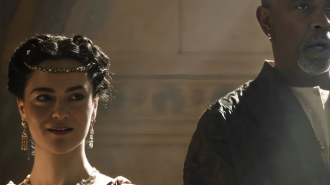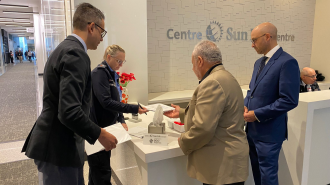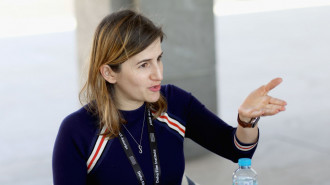My Fourth Time, We Drowned: Corruption, torture and refuge on the world's deadliest migration route
In the same week she won the prize for journalist of the year at the 2023 Irish Journalism Awards, Sally Hayden agreed to talk to The New Arab about her book My Fourth Time, We Drowned: Seeking Refuge on the World’s Deadliest Migration Route.
The book, which won the 2022 Orwell Prize for Political Writing, is an indispensable examination of the multiple threats faced by migrants and asylum seekers on their way to Europe and how European policies have made migration even more dangerous.
My Fourth Time, We Drowned is built on Hayden’s reporting and independent investigations, her talks with officials and NGO workers in both Europe and Africa and even more importantly, on the testimonies of hundreds of migrants and asylum seekers who witnessed first-hand the events recounted in the book.
"One of the greatest challenges to humanity in the twenty-first century will be how it deals with migration. Much of that is less about capacity and more about human greed"
Hayden’s book begins when the journalist receives a message from an Eritrean migrant trapped in Ain Zara, a detention centre in Libya, amidst fighting between different Tripoli militias in August 2018. The Eritrean man wanted the world to know that he was part of a group that had been abandoned without food by the Libyan guards in charge of the detention centre.
Before the combats intensified, detainees had been forced to work in the homes of wealthy Libyans and women had been subjected to rape. Some migrants were sold back to smugglers, who tortured the migrants while asking their families for ransom money.
Those messages sent by the Eritrean man, who had decided to contact Hayden via a hidden phone because his brother was familiar with Hayden’s previous reporting from Sudan, were the first of thousands of others that would follow. These testimonies would be instrumental in helping the Irish journalist document the ordeal migrants go through to reach Europe.
|
As Hayden explains to The New Arab, “People risked their lives to make some of this information public.” Despite the fears of retaliation at the hands of prison guards, Hayden established a wide network of contacts in different Libyan detention centres that kept sending her messages and images, some of which are found in the book.
This is a story in which the EU is deeply complicit. Under the 2017 EU-Libya deal, “the EU and member countries have chosen to furnish money, vessels, training, and aerial surveillance to abusive Libyan armed groups so they can intercept and forcibly return people to Libya,” denounces Human Rights Watch.
Once in Libya, migrants are confined to detention centres where sexual violence, unlawful killings, forced labour, torture, starvation, and contagious diseases are rife.
Hayden believes that what we see nowadays is “a big distancing between the policies that are created and the human consequences of them.” On top of this, “the voices of the people who are experiencing abuses are often being silenced. I do not think that most Europeans are aware that this is happening,” she tells The New Arab.
During her visit to the Italian island of Lampedusa in September 2023 alongside Italy’s Prime Minister Giorgia Meloni, European Commission President Ursula von der Leyen stated, “We will decide who comes to the European Union, and under what circumstances. Not the smugglers.” Human smuggling is a dirty business, but the way it is portrayed and combatted by European leaders is very often counter-productive. For instance, some boat drivers who end up languishing in European jails are migrants themselves who agreed to drive the boats to secure a place on board.
In her book, Hayden writes about one of the few instances in which leading human traffickers were brought to court. The process took place in Addis Ababa, Ethiopia, in early 2021. The two traffickers on trial were found guilty, although one of them had escaped by the time the verdict was read.
Hayden explains to The New Arab that “a lot of the very powerful smugglers tend to have links with the authorities in different countries and the chance of them getting arrested or prosecuted or even facing any sort of real justice is much lower because they have these links.” She adds that “European countries are going after the lowest people rather than the powerful people.”
"Ukraine showed us that a more empathetic policy was possible. We had had the last decade of being told it was not possible and then you suddenly realise that it has been possible all along"
To be sure, draconian migration policies are not the monopoly of the EU. After the UK Supreme Court recently rejected the British government’s plan to send migrants to Rwanda, we discuss the potential of legal means to challenge migration policies that go against human rights. Hayden is rather pessimistic about it. She says that “the main downside of the law is that law moves very slowly and so it can take a very long time for you to see results.”
Hayden also notes that “even if there is a legal ruling, loopholes can be found.” This appears to be exactly the strategy of British Prime Minister Rishi Sunak, who is seeking to introduce new legislation that would bypass the Supreme Court’s concerns about the safety of asylum seekers in Rwanda.
One of the chapters in “My Fourth Time, We Drowned” is dedicated to Rwanda. Hayden visited Rwanda before the beginning of the coronavirus pandemic to report on a program organised by the UN High Commissioner for Refugees (UNHCR) and funded by the EU to relocate asylum seekers from Libya to the East African country. During her trip to Rwanda, the local authorities did everything possible to interfere in her reporting.
|
When she finally had the opportunity to meet some of the people she had been in contact with since their time in Libya, they explained that their meetings to make communal decisions, which they called ‘congregations’ back in Libya, were banned in the Rwandan detention centres. They also reported that, despite UNHCR’s promises that the stay in Rwanda could be the previous step to resettlement in wealthier countries, they feared they had been tricked into moving further away from Europe.
Hayden perceives a lot of defeatism within the EU about the possibility of having a more humane migration policy. However, she notes in the interview with The New Arab that “Ukraine showed us that a more empathetic policy was possible. We had had the last decade of being told it was not possible and then you suddenly realise that it has been possible all along.” The EU is currently hosting around six million refugees from Ukraine.
Hayden calls for listening to those who undertake dangerous journeys to reach Europe. The conversations about Europe’s migration policy towards Africa and the Middle East “need to include people who are taking these journeys, not just to ask them their experiences but also their opinions on policies,” she tells The New Arab.
In a recent speech to the European Parliament, Hayden advocated for understanding migration as the complex phenomenon it represents. She said that “Europe has exploited the wealth and resources of other countries for centuries … and that has contemporary consequences which need to be acknowledged.” She also contended that “the so-called migration crisis needs to be reframed as a global inequality crisis.”
As Hayden explains to The New Arab, “There is not one homogenous mass of people who are moving.” Instead, “the only thing they all have in common is that they do not have a powerful passport which makes it easier for them to travel through legal routes.”
In the concluding pages of My Fourth Time, We Drowned, Hayden writes that “one of the greatest challenges to humanity in the twenty-first century will be how it deals with migration. Much of that is less about capacity and more about human greed.”
Although Hayden continuously emphasises that she is a journalist, not an activist, the Irish journalist explains that she is constantly asked whether there is reason for hope. This is certainly not an easy question considering that Europe’s response to conflict and economic crises in Africa and the Middle East has been to erect higher fences and reach unsavory deals with dictatorial partners to contain migration. Her answer? “You do not need to be hopeful to still do the right thing."
Marc Martorell Junyent is a graduate of International Relations and holds an MA in Comparative and Middle East Politics and Society from the University of Tübingen (Germany). He has been published in the London School of Economics Middle East Blog, Middle East Monitor, Inside Arabia, Responsible Statecraft and Global Policy.
Follow him on Twitter: @MarcMartorell3







 Follow the Middle East's top stories in English at The New Arab on Google News
Follow the Middle East's top stories in English at The New Arab on Google News


